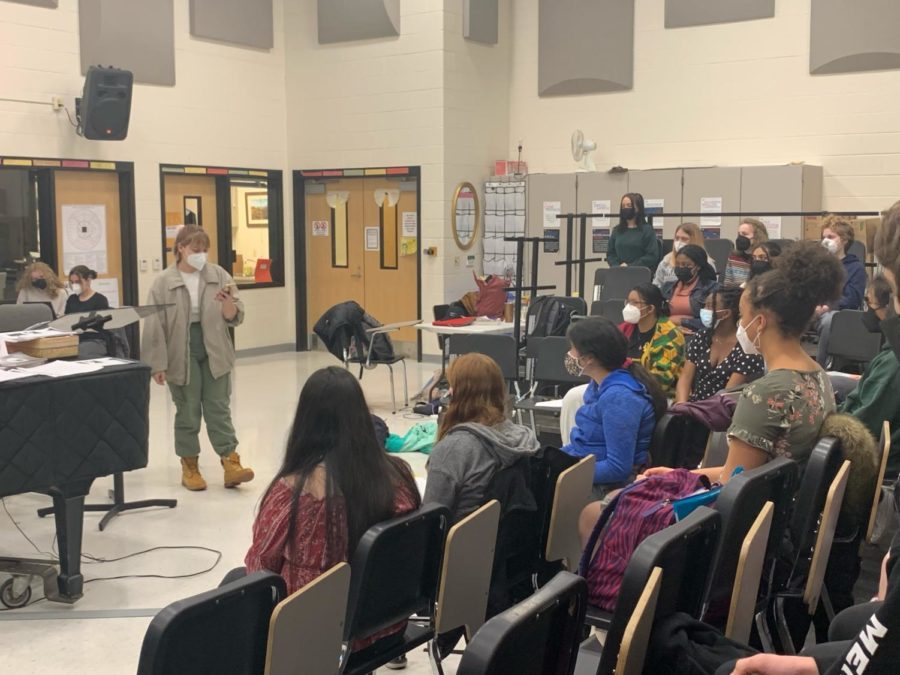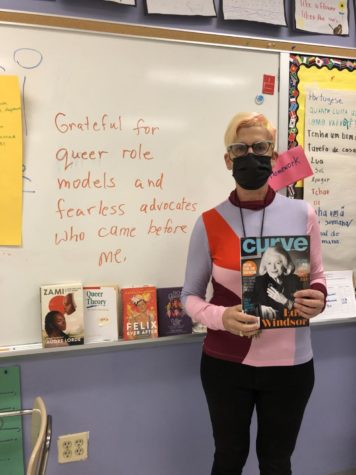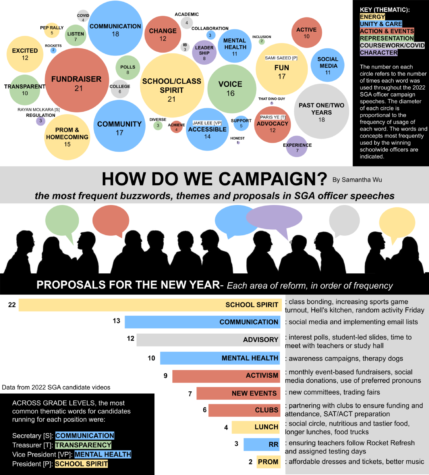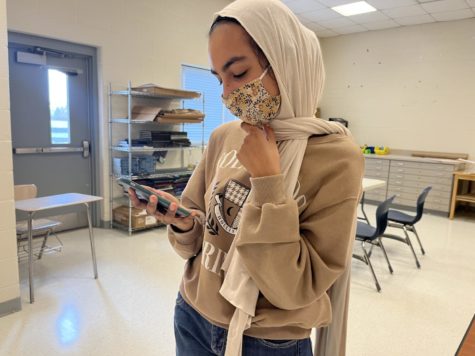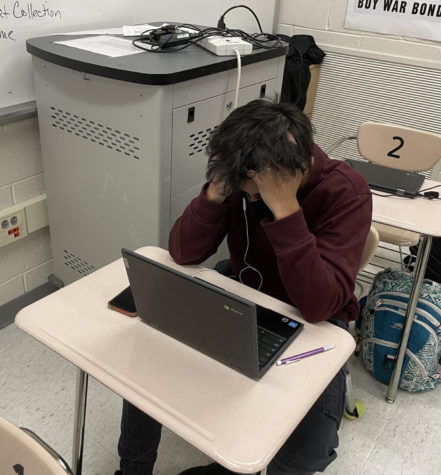“The Sound of Music” dispute leads to drama director’s resignation
Senior Aylin Apaydin auditions for the spring musical, “The Sound of Music.”
For the information presented in this story, Tide staff interviewed 11 administrators, crew, actors, teachers and drama board members.
Following backlash regarding the use of Nazi iconography in the spring production of “The Sound of Music,” former drama director Laura Andruski left her position on Monday, Feb. 7.
After multiple meetings with administration and drama sponsors and a search for a new director, Ms. Emily Davis agreed to return to the position for the spring, and the drama department agreed to further limit the use of Nazi icongraphy to two banners with swastikas. The banners will not be created or handled by students, and should be locked away at all times except the actual show dates.
The drama department also suggested addressing antisemitism and hate speech depicted in the play through a trigger warning on the playbill and donations to the Holocaust Memorial Museum in Washington D.C collected during show night.
“The Sound of Music” is set in the 1940s, when Nazi Germany invades Austria. In Act 2, the Captain is informed that he must serve in the new Nazi army, so the von Trapp family attempts to flee Switzerland through the Alps.
The traditional staging of “The Sound of Music” includes cast members portraying Nazi soldiers, and a set design featuring red banners with swastikas.
“There is a significant important part of the play that was a scene where some banners come down during a festival that as collaboratively, the students and the adults felt that if you removed that, from the musical, that it would not really communicate the impact of that moment,” junior Kit Kringel, who is playing the baroness, said.
Members of the Black Maskers initially raised concerns about creating, handling, and using the props and set design. Set deck chief and senior Johnny Newhouse emailed Ms. Andruksi on Feb. 2, asking if there was “a way to stage the show without bringing any Nazi memorabilia into the school.”
In response, teachers and staff members involved in the production affirmed the show would go on, but expressed a willingness to discuss students’ concerns in-person. In an email to the drama department, Ms. Andruski stated, “the dramatic arts are not just used to entertain, but to enlighten and educate… we feel that it will be important to remind our audiences WHY this symbol of hate and bigotry is deserving of our scorn and ridicule.” She said her director’s vision was to stay true to the love story of the musical while simultaneously portraying Nazi Germany as the antagonist, educating audiences about the mistakes of the past. “In closing, participation in [the] drama club is voluntary. If you are uncomfortable with the use of Nazi iconography that will be used in the production, you need not participate,” Andruski wrote. “For those that do decide to be a part of “The Sound of Music,” I look forward to sharing the important lessons that can be learned from this show with one another and our audiences.”
Some students were dissatisfied with this response. “It rang alarm bells with me because [leadership] was like, let’s talk to other adults in the club rather than talk to other students,” Newhouse said.
“They didn’t address it. They didn’t get back to us and specifically say ‘there won’t be, there won’t be, there won’t be’. So to us, it was an open question,” Kringel said. “I was worried that people would feel pressured to be part of it if they weren’t comfortable or felt like they couldn’t participate because of the subject matter.”
Shortly after, 113 students drafted and signed an open letter expressing their discomfort about handling the set pieces, and requested a meeting with adults involved.
“Given the way that Nazism is handled in The Sound of Music, we believe the students have raised several options as effective replacements for the offensive iconography,” the letter states. Some of the suggested replacements had been to obscure the iconography with paint, or simply use a red circle on the banners.
“Most people were upset with the response on the part of the director, and also, just generally the adults involved in the production, to basically ignore student voices and not listen when people were expressing how uncomfortable they were,” one of the authors of the open letter, Julia Angel, said.
This led to a group meeting attended by administration, Black Maskers leadership and drama sponsors. It was clarified that students would not be wearing armbands, and nobody on the crew would be drawing or handling any Nazi iconography.
During the meeting, the drama department also agreed to include the swastikas in one scene, and proposed accompanying the production with Holocaust educational measures. There are tentative plans to include information in the program highlighting the Nazi banners as a trigger warning, and collect donations during the show for the Holocaust Memorial Museum. “We are [also] working with Ms. Deeney and students in the Jewish Student Union in creating advisory lessons about antisemitism in America today,” drama board member Victoria Koretsky said.
Auditions for the musical that were scheduled to be held after school Feb.8-9 were canceled for a brief period last week following Ms. Andruski’s resignation. This led many to believe that the spring musical would be canceled. A rapid search for a new director ensued. After four days of uncertainty, the drama department announced they would be resuming preparations for the spring musical on Thursday, Feb. 10, after Mrs. Davis, the former drama director, agreed to return to her former position for the spring.
“When she was made aware that the RM kids did not have a director, we talked about it a little bit and thought, ‘She can make it work.’ And now she’s excited to do it,” RM teacher and husband of Mrs. Davis, Mr. Davis, said. Mrs. Davis directed the same show almost two decades ago, in 2005. “It’s a show she’s familiar with, but it’s kind of like a whirlwind getting up and ready to do it again,” Mr. Davis said.
Mrs. Davis’ new role requires cooperation with both the faculty administration and students.
“I do know that she had conversations with Mrs. Deeny,” Mr. Davis said when asked about what new measures the board was taking for the production. “I know she’s also had conversations with the student leadership of drama, the drama board.”
The particular scene involving the banners with swastikas is a music festival where the von Trapp family is performing. Midway through, the Nazis take over, creating a climax point in the play.
“Collaboratively, the students and the adults felt that if you removed that from the musical, that it would not really communicate the impact of that moment,” said principal Alicia Deeny. Many students expressed their side that the banners should be problematic, and cause viewers to feel uncomfortable. “It wouldn’t capture the fact that we should be disturbed by these images,” Deeny said.
Although both directors had reservations about staying accurate to the historical aspect of the script, Mrs. Davis plans for “the show to go on, directed in a way that felt authentic to her,” according to Mr. Davis.
Auditions resumed Thursday, Feb. 17 and went through the following weekend. Between new changes and a new director, “auditions have been really fun! It’s been really exciting to have Ms. Davis back, and we’re really excited to be able to just put the show on,” Koretsky said.
Ms. Andruski did not reply to the Tide’s request for comment.
Your donation will support the student journalists of The Tide, Richard Montgomery High School's student newspaper. Your contribution will allow us to purchase equipment and cover our annual website hosting costs.
Hrishita is moderately excited to be writing for The Tide this year. She is the Editor-in-Chief of Marooned, RM's satirical magazine, so technically, she's...
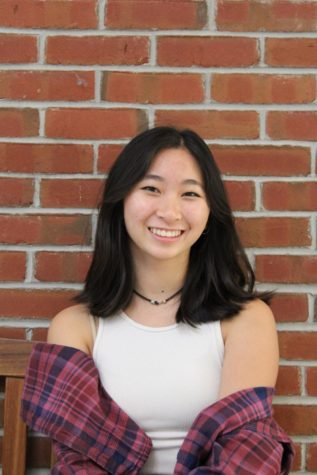
Samantha Wu is thrilled to spend her senior year as Editor-In-Chief of The Tide, after three years as editor and COVID beat reporter for the News section....

Shuxin is on her third year as assistant Centerspread editor. When she’s not designing new concepts, she can be found anxiously catching up on graphics.



